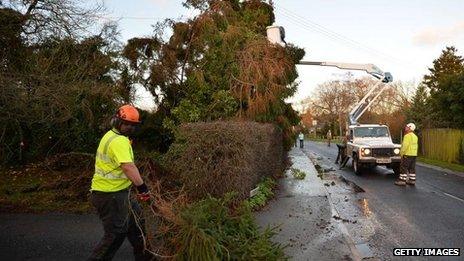Bosses accused of 'complacency' over Christmas power cuts
- Published
Committee chairman Tim Yeo: "You've displayed a neglect for your customers which I personally find absolutely astonishing."
Bosses of UK energy distribution firms have been accused of "complacency" as they defended their response to storms that led to power cuts over Christmas.
About 750,000 properties were affected, and many left without power for days.
UK Power Networks' Basil Scarsella said "tried and tested" plans struggled to cope in worse-than-forecast weather.
But Commons Energy Select Committee chairman Tim Yeo said there seemed to be a lack of any "expression of real concern" by firms for those affected.
After the first 45 minutes of the hearing, Mr Yeo told the bosses that the "tone of this conversation and its contents has been utter complacency".
He criticised trade body the Energy Networks Association for failing to be able to confirm whether it stood by its earlier report suggesting that 75,000 customers were left without power for more than 24 hours.

Falling trees brought down power lines across the south of England in December
The ENA could not provide the "most basic information on a totally predictable question", he said.
Mr Yeo concluded the session by saying there was "no sense of urgency" in plans to improve capacity to respond to severe weather, despite "clear warnings that extreme events are likely to take place".
He said: "I've heard nothing at all this morning which reassures me that you are taking this problem seriously enough...
"I have to conclude that you are exploiting your privileged monopoly position and you have displayed a neglect of your customers which I personally find absolutely astonishing."
'No weak points'
Strong winds brought down power lines just ahead of Christmas, with the south east of England, particularly parts of Kent, Surrey and Sussex, and northern Scotland worst hit. Winds on the evening of December 26 affected residents in north Wales and north-west England.
The committee examined how the companies reacted to the weather and communicated with their customers.
Bosses from Scottish Power, Scottish and Southern Energy, Electricity North West, and Western Power Distribution - the companies behind the networks that carry electricity - also gave evidence.
Mr Scarsella, chief executive of UK Power Networks, which maintains cables across the South and South East of England, told the MPs the storm turned out to be more severe than forecast.
"We have a methodology that estimates the damage expected on the network based on the wind speeds. But the wind speed and the weather forecast escalated significantly."
He said: "The damage was not caused by weak points in the network."
Mr Scarsella said another issue was "that this was a national storm and it lasted over two or three days. There is a well-tested mutual aid system which enables any of us to call on our colleagues to send additional resources.
"But because of the severity of the storm and the national nature of the storm we were not able to provide additional resources to other networks or indeed receive additional resources."
The committee heard of repairs in some flooded areas taking place on boats and how engineers were unable to begin their work because hundreds of trees needed to be cut through.
Mark Mathieson, managing director of Scottish and Southern Energy's electricity networks, praised the efforts of staff who turned out to reconnect properties.
He added he felt affected customers were understanding of the problems caused by a "unique" weather situation.
But he said the industry has to "learn lessons".
"We as an industry clean these events up much quicker than we used to. But we also recognise the impact that has on customers," he said.
David Smith, chief executive of the Energy Networks Association, surprised MPs when he could not remember a figure
"We are sorry and I did go out to communicate with customers that we were sorry that they were off."
The MPs also quizzed the energy chiefs on the compensation paid to customers.
They confirmed they will pay out higher than usual compensation to people who were without power for long periods and on Christmas Day.
The committee was told that planning for the 999-style emergency number which customers could call to report power outages was "in its early stages".
- Published6 January 2014
- Published10 January 2014
- Published3 January 2014
- Published31 December 2013
- Published30 December 2013